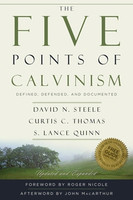
Steele, David N., Thomas, Curtis C. & Quinn, S. Lance
The Five Points of Calvinism: Defined, Defended, and Documented (Steele, Thomas & Quinn)
It was said by one of the Hodges that this book by Dr. Giradeau was the most convincing argument for Calvinism to be seen anywhere.
What is it about this book that has made it so convincing?
- This professor had something of the rapier-like incisiveness of the literary craftsmanship and something of the genuinely oratorical, pulsating with warmth of religious devotion.
- Dr. Giradeau argues for a particular kind of Calvinism. It is the federal scheme and presented with sufficient fullness to show how so many points of doctrine fit into this scheme.
- Dr. Giradeau argues against a particular kind of antithesis to his particular kind of Calvinism. He argues against Arminianism, and against a particular kind of Armininianism, which has been claimed to be without certain of the disadvantages of the older Arminian system.
If, after these many decades, wee are right in seeing signs of an ascending of Calvinism, conditions would seem more favorable for the effectiveness of this book as here newly issued, than was the case at the first.
Table of Contents:
Part 1
Section 1: Doctrine of Election Stated and Proved
Section 2: Doctrine of Reprobation Stated and Proved
Section 3: Objections from the Moral Attributes of God Answered
Preliminary Remarks
From Divine Justice
From Divine Goodness
From Divine Wisdom
From Divine Veracity
Section 4: Objections from the Moral Agency of Man Answered
Part 2
Transitional Observations
Section 1: Calvinistic Doctrine of Justification Stated
Section 2: Ground of Justification
Section 3: Nature of Justification
Section 4: Condition of Justification
Author
John Lafayette Girardeau (1825–1898) was a Reformed theologian and minister in the Presbyterian Church in the United States.